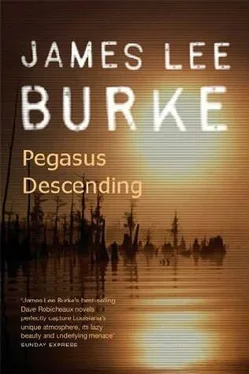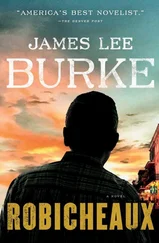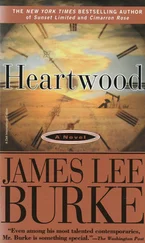You didn’t trade shots with Koko Hebert unless you were willing to take a heavy load of shrapnel.
I WENT HOME and had a light supper with Molly, then drove up the bayou in the sunset to Loreauville and Bello Lujan’s stable. The fields were green and sweet-smelling, the clumps of oaks along the road pulsing with birds. The crime scene tape flickered and bounced in the wind. I walked behind the stable and looked at the spot where Mack had found the murder weapon, then studied the breadth of the field where the killer had run toward the steel back fence. What had I missed? Not just here, but in all the interviews involving Yvonne Darbonne and Monarch Little and Slim Bruxal and Crustacean Man and Tony and Bello Lujan. The key glimmered on the edge of my vision, like a shard of memory you take with you from a dream. It lay in an insignificant remark, an oblique reference that I had passed over, a piece of physical evidence that was like a grain of sand on a beach. But what?
On the other side of the steel fence, two little boys and a girl, all of them black, were flying a kite emblazoned with the American flag. The girl, who was not over eight or nine, was holding the kite string. They had made a fort of propped-up plywood inside a stand of persimmon trees and inside the walls had spread a blanket on the ground. A box of snack crackers, a plastic pitcher of what looked like Kool-Aid, three candy bars, and a can of tuna had been dumped out of a grocery bag onto the blanket.
“You guys doin’ all right?” I said.
“We’re camping out, least till dark,” one of the boys said.
“Y’all weren’t out here early this morning, were you?”
“No, suh,” the same boy said.
“That’s a fine fort you’ve got there,” I said.
“Yes, suh,” the same boy said.
His eyes left my face and looked up at the kite popping against the sky. The other boy seemed to concentrate unduly on the kite as well. The girl had wrapped the string around her wrist and was making a game of pulling on the string and releasing it, so that the kite rose, then sagged and rose again in the sunset. She wore elastic-waisted jeans and pink tennis shoes and a white blouse with tiny flowers printed on it. She had big brown eyes and pigtails and a round face and skin that was as dark and shiny as chocolate. Her expression was a study in innocence.
“You guys didn’t go inside that yellow tape on the stable, did you?” I said.
No one answered.
“What’s your name?” I asked the girl.
“Chereen,” she said. “What’s yours?”
“Dave Robicheaux. I’m a police officer. Did y’all see anybody run across this field early this morning?”
“We wasn’t out here,” she replied.
“But later maybe you guys went over to see what was going on?”
They looked at one another, then at the birds freckling the sky.
“Y’all sure you don’t want to tell me something?” I said.
“Want some crackers and Kool-Aid?” the girl said.
“Thanks just the same. Don’t you guys go on the other side of that yellow tape, okay?”
“No, suh, we ain’t. Gonna stay right here, outside the fence.”
I waved good-bye to them and walked away. When I glanced back over my shoulder, one of the boys was working open the can of tuna while the other boy filled three plastic glasses with Kool-Aid.
I DROVE BACK into New Iberia and visited Monarch Little at Iberia General. He was sitting up in bed, watching a Chicago White Sox game on the television mounted high up on the wall, the sheet drawn up over his sloping girth. I sat down on the side of his bed and picked up each of his hands and examined his skin from his wrists to his upper arms.
“What you doin’?” he said.
“Lean forward,” I said.
“What for?”
“So you don’t end up charged with murder. For once in your life, try cooperating with someone who’s on your side.”
He sat motionless while I looked closely at his face and hair and throat and the back of his neck.
“Take off your shirt,” I said.
“Mr. Dee-”
“Just do it.”
He pulled off his pajama top, held his massive arms straight out, and let me examine his chest and back.
“That’s it,” I said.
“That’s what?”
“You didn’t kill Bello Lujan.”
“That’s a big breakt’rew for you? I ain’t never killed nobody.”
“Why’d you put all that skag in your arm, Monarch?”
“Felt like it.”
“You almost caught the bus, partner.”
“Maybe I’d be better off.”
“What about all those soldiers in Iraq? What kind of day do you think they’re having?”
“I tried to join the army. They didn’t want me.”
My question to him had been a cheap shot and I deserved his reply. I sat in a chair next to his bed for a long time and didn’t say anything. He tried to concentrate on the televised baseball game, but it was obvious he was becoming more and more uncomfortable with both my presence and silence.
“You got some wiring loose in you, Mr. Dee,” he said.
“I want you to call me as soon as you get out of here,” I said.
“What for?”
“My wife wants you to come over for dinner.”
There was a broken smile at the corner of his mouth. “Who you kidd-” he began.
“Don’t mock her invitation. She used to be a Catholic nun. She’ll rip your arms off and beat you to death with them,” I said.
He made a show of crushing the pillow down on his own face, but I could hear him laughing under it.
THAT NIGHT the weatherman on the late news talked about another storm building in the Caribbean, one that was expected to reach hurricane velocity as it approached Cuba. I fell asleep on the couch while dry lightning flickered in the trees and leaves gusted in the street. I dreamed about baseball and summer evenings in City Park back in the 1950s, when we played pepper games in front of the old wood and chicken-wire backstop that was overhung by oak trees dripping with Spanish moss. In the dream the air smelled of boiled crabs and barbecue grease flaring on hot charcoal, and I could hear a Cajun band playing “Jolie Blon” down by the old brick firehouse. The dream seemed to reflect an innocent time in our history, an idyllic vision I have never been able to disengage from. But in reality there were many elements of the 1950s that were not so innocent, and Monarch Little was there, in the dream, to tell me that. Or at least that was what I thought.
He was standing at home plate with a bat propped on his shoulder, in an era when people of color were not allowed in the park, whacking grounders to the three black children I had seen flying a kite by Bello Lujan’s back fence. Except in the dream the children were uninterested in Monarch and his baseball bat, and were sitting on the close-cropped grass just beyond the infield, eating a picnic lunch. One of the children was opening a can of tuna.
I woke from the dream like a man breaking through a pane of glass.
THE NEXT MORNING was Saturday. I got up at seven and dressed in the kitchen so I wouldn’t wake Molly. I fed Snuggs and Tripod on the back steps, left Molly a note on the chalkboard we used for messages, took a half-carton of orange juice out of the icebox for myself, and drove down St. Peter Street to Iberia General. Monarch was just checking out of the hospital as I came through the reception area.
“I need to talk with you,” I said.
“I got a cab coming,” he said.
“After we talk, I’ll take you wherever you want to go. My truck’s outside.”
“I ain’t eat yet,” he said.
“That makes two of us,” I said.
We headed toward the McDonald’s on East Main. The clothes Monarch had been wearing when the paramedics pulled him out of the ice water at the crack house had been washed and dried at the hospital and, riding in the truck, with the windows down and the trees and shadows sliding by us, he looked cool and comfortable, strangely at peace with himself. I pulled into the line of vehicles at the take-out window.
Читать дальше












